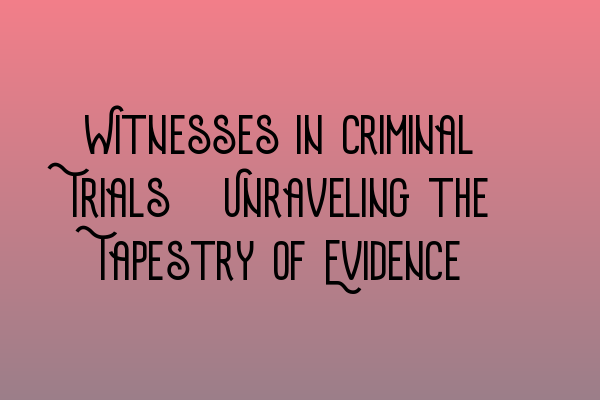Witnesses in Criminal Trials: Unraveling the Tapestry of Evidence
In the intricate web of a criminal trial, witnesses play a crucial role in revealing the truth and shaping the outcome of the case. Their testimonies, when presented effectively and credibly, can sway the jury and bring justice to those who deserve it. As a solicitor at SQE Criminal Law & Practice Law UK, I am dedicated to unraveling the tapestry of evidence by analyzing the significance of witnesses in criminal trials.
The Importance of Witnesses
Witnesses serve as the eyes and ears of the court, offering firsthand accounts of events and providing crucial information. They can shed light on the circumstances surrounding a crime, identify perpetrators or victims, and provide insights into the motives and intentions of those involved. Without witnesses, the truth may remain obscured, and justice may be elusive.
Whether they are expert witnesses, eyewitnesses, character witnesses, or police officers, each witness brings their unique perspective and knowledge to the courtroom. Their credibility and reliability are essential in determining the weight given to their testimonies.
Expert Witnesses: Unlocking Specialized Knowledge
Expert witnesses hold specialized knowledge in a specific field relevant to the case. They provide an analysis or interpretation of evidence that aids the court in understanding complex issues. By presenting expert witnesses, solicitors can strengthen their arguments and support their client’s case.
In criminal trials, forensic experts, psychologists, or medical professionals can provide valuable insights into the nature of the crime, the mental state of the accused, or the cause of injuries. Their objective and unbiased opinions can carry significant weight in convincing the jury and influencing the judge.
Through a strategic selection of expert witnesses, solicitors can bolster their client’s position and refute opposing arguments. However, it is crucial to ensure that the expert witnesses are well-qualified, impartial, and can withstand cross-examination.
Eyewitnesses: The Power of Perception
Eyewitness testimonies have long been regarded as a cornerstone of criminal trials. They are considered firsthand accounts of events and hold immense persuasive power. However, research has shown that eyewitness testimonies can be fallible due to memory distortion, suggestibility, and biases.
As solicitors, it is essential to critically evaluate eyewitness testimonies and challenge their reliability if necessary. Cross-examination can uncover inconsistencies, gaps in memory, or potential biases of the witness. By presenting alternative explanations or challenging the accuracy of an eyewitness account, solicitors can cast doubt and raise reasonable doubt in the minds of the jury.
Furthermore, corroborating eyewitness testimonies with physical evidence, such as DNA, fingerprints, or surveillance footage, can strengthen the overall credibility of the prosecution or defense. This integration of multiple sources of evidence creates a more compelling narrative and increases the chances of a successful outcome.
Character Witnesses: Shaping Perceptions
In some cases, solicitors may call upon character witnesses to testify in support of their clients. Character witnesses can vouch for an individual’s reputation, integrity, or moral character. Their testimonies aim to create a more positive perception of the accused and counter the allegations made against them.
Character witnesses can be family members, friends, colleagues, or community members who have had personal interactions with the accused. By highlighting the accused’s positive qualities and presenting evidence of their good character, solicitors can humanize their clients and present them in a more favorable light.
Police Officers: Guardians of Truth
Police officers are often crucial witnesses in criminal trials as they are the ones who initially investigate crimes, make arrests, and gather evidence. Their testimonies serve to provide context, establish timelines, and authenticate documentary or physical evidence.
Furthermore, police officers can testify to the accused’s behavior or statements made at the time of arrest or during the investigation. These testimonies can be instrumental in establishing the accused’s intent, state of mind, or consciousness of guilt.
However, it is important to note that not all police officers are infallible. Solicitors must meticulously examine the conduct of the police officers involved in the case. Any instances of misconduct, bias, or procedural errors could have a significant impact on the credibility of their testimonies.
A Holistic Approach to Witness Testimonies
Effectively utilizing witnesses in criminal trials requires a holistic approach. Solicitors must carefully select witnesses based on their expertise, credibility, and the relevance of their testimonies to the case. Furthermore, solicitors must skillfully examine and cross-examine witnesses to extract the most accurate and reliable information.
By integrating expert witnesses, evaluating eyewitness testimonies, presenting character witnesses, and scrutinizing police officer testimonies, solicitors can weave together a comprehensive narrative that supports their client’s case. This holistic approach maximizes the chances of a favorable outcome and ensures the integrity of the criminal justice system.
At SQE Criminal Law & Practice Law UK, we understand the critical significance of witnesses in criminal trials. Our solicitors have extensive experience in unraveling the tapestry of evidence, skillfully utilizing witnesses, and presenting compelling arguments in court.
Related Articles:
